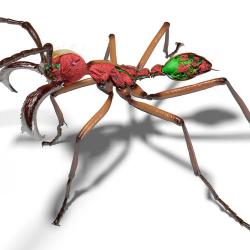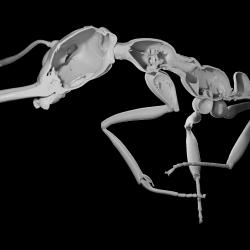Big Questions In Science- 5) How do genes change functions in nature?
What do a fruit fly and a mouse have in common? More than you might think, says Entomology Professor Leslie Pick, who studies the regulatory genes that control embryo development. In the 1990s, Pick’s lab created transgenic fruit flies by inserting a mouse regulatory gene into a fly genome. Using genetic tools, the researchers then expressed the mouse gene in place of the analogous fly gene. “We were amazed that the mouse gene performed a job necessary for the fly’s development,” says Pick. “We would have thought that the genes for developing a fly—with its cuticle, wings and six legs—would be completely different than those for a mouse.”
Pick’s experiment and others have changed the way biologists think and led to the launch of a new field called evolutionary developmental biology, or simply “evo-devo.”
The field explores two of nature’s biggest wonders: the development of complex organisms from single-cell embryos and the astonishing diversity of these organisms.
Pick investigates how regulatory genes evolve to allow for this diversity. Encased in a single-celled embryo, regulatory genes act like a set of developmental instructions, controlling the expression of other genes and the cell- differentiation process. Particularly intriguing is the fact that many of the same regulatory genes appear in very different species.
Pick tracks the evolution of the ftz gene, pronounced “futz.” “This gene seems to have changed more than some other regulatory genes and now regulates totally different genes than its ancestral form,” explains Pick, who conducts the research with NSF funding. “In the fruit fly it regulates segment formation, but in other species it plays a different role. The gene has switched its function somewhere during evolution.”
Mysteries abound about this process. “If we made these types of mutations in the lab, the embryo would die,” says Pick. The question remains: How could the genes change in nature without damaging the embryo? Pick predicts: “We will find that evolution works by changing the expression and function of regulatory genes, little bits at a time, that allow the animals to survive and thrive in the wild.”
Pick is serving as a rotating program director on evo-devo at NSF until June, while still maintaining her CMNS research projects. “It’s been a great opportunity to view the field from a higher level and see how my research fits into the bigger picture.”
Writer: Beth Panitz







